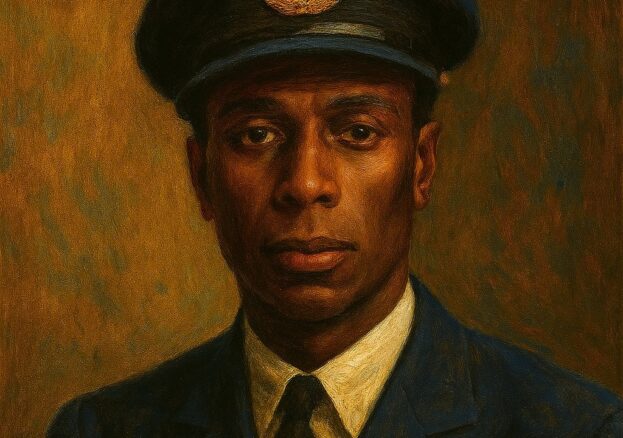
Philip Louis Ulric Cross (1917–2013) lived one of the most extraordinary lives of the twentieth century. From a young man in colonial Trinidad with limited prospects, he became one of the most decorated Caribbean airmen of the Second World War. After the war he built a distinguished career as a lawyer, judge, and diplomat, helping to shape the future of newly independent nations in Africa and the Caribbean. His story reflects courage, determination, and service across two continents.
Ulric was born in Port of Spain, Trinidad, in 1917. He was educated at St Mary’s College, a respected Catholic school, and after leaving worked briefly as a clerk at the Trinidad Railways and at a radio station. Yet he felt his ambitions were restricted in a society where colonial hierarchies limited opportunities for young Black men. Years later, when asked why he joined the war effort, he explained simply: “At the time, there was nothing to do in Trinidad. There was no opportunity. That’s why I joined the RAF.”
In 1941, at the age of 24, he travelled across the Atlantic to Britain to enlist in the Royal Air Force. He trained as a navigator and was posted to Bomber Command, one of the most dangerous branches of the RAF, which suffered some of the heaviest losses of the war. His skill and courage soon brought him to the attention of senior officers, and he was selected for the Pathfinder Force.
The Pathfinders were elite units responsible for locating and marking bombing targets with flares ahead of the main force. Their work required accuracy, quick thinking, and immense bravery. Cross flew more than 80 Pathfinder missions, navigating through anti-aircraft fire and enemy fighters. His exceptional navigation skills and composure under pressure earned him the nickname “The Black Hornet.”
For his service, Cross was awarded the Distinguished Flying Cross (DFC) in 1944 and the Distinguished Service Order (DSO) in 1945, two of the highest honours available to RAF officers. By the end of the war, he had risen to Squadron Leader, making him one of the most highly decorated Caribbean airmen of the conflict.

After the war, Ulric stayed in Britain to study law at Middle Temple in London. Qualifying as a barrister, he soon returned to Trinidad, but his skills were in demand far beyond the Caribbean. In the 1950s and 60s, as newly independent African nations built their institutions, Cross lent his expertise. He worked in Ghana under Kwame Nkrumah, in Cameroon, and in Tanzania, helping draft constitutions, train legal professionals, and establish judicial systems. This work placed him at the heart of the post-colonial transformation of Africa.
Back in Trinidad and Tobago, Cross rose to senior positions in public service. He served as Solicitor General, later as a High Court Judge, and became widely respected for his integrity and fairness on the bench. His legal career was complemented by diplomacy: in the 1990s he was appointed High Commissioner for Trinidad and Tobago to the United Kingdom, serving in London, and also held the same role in Canada. In these posts he represented his nation abroad with distinction, drawing on his experience of both war and law.
Although his achievements were extraordinary, Cross’s story remained relatively little known in Britain for many years. That began to change with exhibitions such as the RAF Museum’s Pilots of the Caribbean, which highlighted the vital but often overlooked contributions of Caribbean aircrew during the Second World War. In 2011, his homeland honoured him with the Order of the Republic of Trinidad and Tobago, the nation’s highest award.
Ulric Cross died in 2013 at the age of 96. His long life was marked by courage in war and wisdom in peace. He is remembered not only as a Pathfinder who guided bombers through the skies of wartime Europe, but also as a builder of nations, helping to shape the democratic and legal institutions of newly independent countries. His story reminds us that the struggle for justice can take many forms — in combat, in law, and in diplomacy.
References & Further Reading
RAF Benevolent Fund – Ulric Cross
https://www.rafbf.org/news-and-stories/raf-history/black-history-month-remarkable-legacy-squadron-leader-ulric-cross
RAF Museum – Ulric Cross
https://www.rafmuseum.org.uk/research/online-exhibitions/pilots-of-the-caribbean/heroes-and-sheroes/pathfinder-squadron-leader-philip-louis-ulric-cross/
Wikipedia – Ulric Cross
https://en.wikipedia.org/wiki/Ulric_Cross
Stephen Bourne – Mother Country: Britain’s Black Community on the Home Front 1939–45
https://thehistorypress.co.uk/publication/mother-country/9780750990834 /
